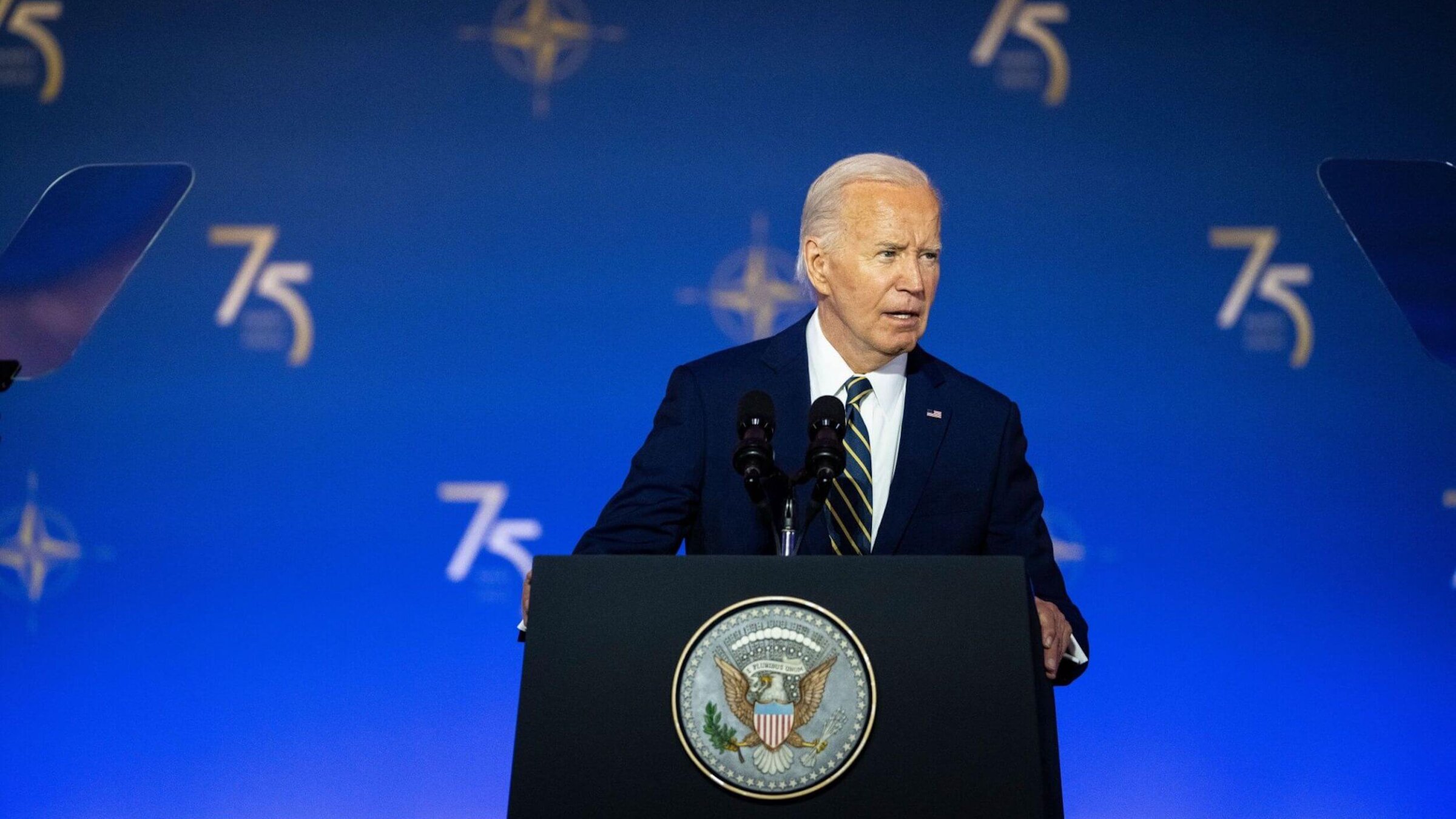Joe Biden is beginning to look a lot like the biblical Jonah. That’s bad news for all of us
God had to remind Jonah that he wasn’t the only character who mattered in his own story. Can anyone convince Biden of the same?

President Joe Biden on Tuesday, July 9. Photo by Graeme Sloan/Bloomberg/Getty Images
The debate around whether President Joe Biden should drop out of the presidential race has reminded me of another Joe. Or, rather, a Jonah.
In the Bible, Jonah has a profound flaw: He fails to understand that the story in which he is living is not just about him. He may be its protagonist, but the consequences of his actions resonate far beyond himself — repercussions he is stubbornly unwilling to understand.
I have thought about Jonah as I’ve watched Biden make excuses and deflections in the fallout from his disastrous debate performance last month, which left many with questions about his cognitive ability and deep concerns about whether he can win in November. Yet Biden, who last week told George Stephanopoulos in a televised interview that he’d accept a loss to former President Donald Trump in November’s election “as long as I gave it my all,” has stayed defiant. He added, “that’s what this is about.”
That is not what this is about. Our democracy is what it’s about.
In the Book of Jonah, the stakes are similar: An entire society, versus one man’s ego.
The titular prophet is sent by God to the ancient city of Nineveh to proclaim judgment against it for the wickedness it’s fostered. After trying to flee and avoid his task, he eventually takes up this cause and tells the people of Nineveh, “Forty days more, and Nineveh shall be overthrown!” The people believe him and proclaim a fast. The king puts on a sackcloth and sits in ashes. God decides that they’ve renounced their evil ways, and rescinds their intended punishment.
This depresses Jonah, who announces to God that he would rather die than live. The text doesn’t say why. Perhaps it’s because, if Nineveh is safe, Jonah’s prophecy — that the city would be destroyed — won’t come true. Perhaps it was because he felt God wasted his time. There are multiple readings of the story. In all of them, though, Jonah and his feelings are central in this moment.
As Jonah pouts in the sun, God covers him with a nice shady plant, only to then have a worm attack the plant so it withers and dies. When Jonah becomes upset, God asks him a question: If Jonah feels justified in being upset about the death of a plant he had no hand in growing, why should God not feel justified in caring “about Nineveh, that great city, in which there are more than a hundred and twenty thousand persons who do not yet know their right hand from their left, and many animals as well!”
The point is that Jonah’s sense of justice isn’t exactly God’s top priority. Nor should it be. There was something bigger and more important than one person’s sense of self at stake.
And no matter how much we might respect Biden, his sense of fairness — and his desire not to move into the next phase of his life — can’t and shouldn’t be the top priority in determining the fate of our country.
Biden has said a few things that reminded me of Jonah. On June 28, the day after the debate, he said, “I give you my word as a Biden. I would not be running again if I didn’t believe with all my heart and soul I can do this job.” But, respectfully, what does his word as a Biden mean to us? Does his belief in his ability matter if voters do not share it?
He has insisted that he’s been counted out before and is going to prove his detractors wrong again. “I don’t think what those big names think,” Biden told Morning Joe earlier this week. “They were wrong in 2020. They were wrong in 2022 about the red wave. They’re wrong in 2024.” Here, too, the focus is on Biden’s own self-image and how it fits up against the larger plot, as opposed to the broader, bigger picture.
But while Biden has so far been the protagonist in this story — the man who defeated Trump in 2020, and whose presidency has quietly achieved a considerable amount despite partisan gridlock — the story isn’t about him. The stakes of this election are not whether Biden gets a chance to prove his detractors wrong. It is not whether he gets to try his best. Whether Biden believes that he can do the job matters very little; whether voters believe he can matters a lot.
Because this is about the country. And if voters do not believe he can still do the job, which polls overwhelmingly suggest is the case, then at stake is not whether Biden gets to keep the job he’s wanted his entire professional life, but whether Donald Trump gets to come back into the White House, and wreak havoc on our democracy.
In his first term, Trump was impeached twice: once for trying to blackmail a foreign country into opening an investigation into his political rival and once for inciting an insurrection. One can only imagine what he will attempt in a second term, given a recent Supreme Court ruling that gives presidents immunity for any of their “official acts.”
And that’s before considering Project 2025, a Heritage Foundation-led policy platform that features goals like purging the civil service and reversing approval of the abortion pill mifepristone to further curtail reproductive choice. Though Trump has tried to distance himself from the project, his platform overlaps with it on most key issues.
And yet, instead of mentioning this in his primetime appearances, Biden offered a Tuesday post on X: “Google Project 2025.” A president who was genuinely concerned about the threat the initiative poses to the United States would have brought it up at the debate or in his television interview, not left it to a tweet. A candidate who knows it is important, but has not managed to articulate why, should step aside (perhaps in favor of his vice president, who has capably spoken of the threat posed by the project).
Biden, like Jonah, has things backwards. Democracy is not important because it allows for his candidacy; his candidacy is important to the extent that it allows us to continue living in a democracy. This election is bigger than any one person’s political ambitions; bigger than his love of the office; and bigger than whether he believes in himself. This is about the United States, that potentially great country, in which there are millions of people who do not yet know their right hands from their left.
















